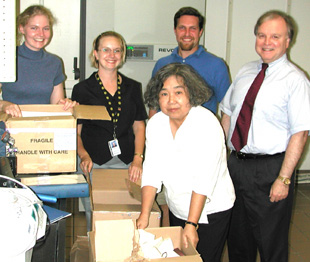In genetics, UNMC’s Munroe-Meyer Institute has focused on clinical genetics, molecular genetics and cytogenetics. Now a fourth genetic specialty program is being added: biochemical genetics. 
This new MMI department is headed by William Rizzo, M.D., a pediatrician from the Medical College of Virginia, where he researched inherited metabolic diseases for almost 20 years.
At MMI, Dr. Rizzo will study diseases that affect lipid metabolism, including Sjögren-Larsson Syndrome (SLS), a rare genetic disorder of fat metabolism causing neurologic and skin symptoms. It is not known how many cases exist in the United States, although Dr. Rizzo estimates hundreds.
For many years, SLS was diagnosed from clinical features alone. In the late 1980s and early 1990s, Dr. Rizzo developed a specific laboratory test to detect this disease. Since then, his lab has been the major referral center for SLS patients and has been responsible for diagnosing most of the SLS patients known throughout the world. With his move to MMI, this test will soon be available in Omaha.
What is SLS?
SLS is a devastating disease. Children have dry scaly skin, called ichthyosis, all over their bodies at birth. Within the first year, developmental delays will be noticed and the child will show signs of mild to severe mental retardation. Symptoms of spasticity resembling cerebral palsy appear in the first year of life, and only one-half of the patients are ultimately able to walk.
 |
Pictured unpacking, left to right: Leigh Anne Heinz, lab technician; Jennifer Bauch, administrative technician; Shu Wei, foreground, lab technician; Eric Heinz, graduate student; and William Rizzo, M.D., lab director. |
The diagnosis is often delayed until later in childhood because many physicians are not aware of this rare disease. After tests detect the syndrome, the parents often find a sense of relief in knowing the diagnosis of their child, even though there is no effective treatment at this time. In the future, American patients will come to Omaha for expert medical advice, while families of affected children from other countries will communicate by phone with Dr. Rizzo.
SLS research at MMI
Many families want their SLS children to be involved in clinical research studies. Research on SLS at MMI will focus on understanding how the biochemical abnormality causes the symptoms. There is hope that effective therapy will be found.
Dr. Rizzo will work in collaboration with Michael Salbaum, Ph.D., of MMI’s Center for Human Molecular Genetics to develop a mouse model for SLS. Joining Dr. Rizzo in his move to Omaha are two technicians and a doctoral graduate student who will finish his thesis research over the next year.
In several months, after his lab is up and running, Dr. Rizzo will recruit post-doctoral fellows to work at MMI. This endeavor has been a collaborative effort of UNMC and Children’s Hospital. In fact, the funding for a lab to research metabolic diseases comes through an endowment through Children’s Hospital, as well as NIH funding to specifically study SLS. Because of these efforts, MMI could well become a national center to evaluate patients with genetic lipid disorders.
On the clinical side, Dr. Rizzo also will head the Section of Inherited Metabolic Diseases in UNMC’s department of pediatrics. Together with Richard Lutz, M.D., of MMI’s endocrinology and genetics departments, he will take over the patient load of Hobart Wiltse, M.D., who recently retired from UNMC.